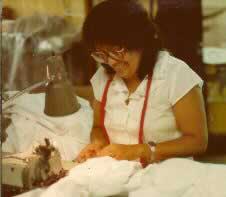Thank you, Norma for your
contribution to the emancipation
of the international working class
LOS ANGELES, CA—On September 6th,
our beloved comrade Norma died after a long
struggle against one of the deadliest diseases
of capitalism, cancer.
Norma's life, like that of many workers, was
very difficult. Since childhood, she had to help
maintain her home. While her mother sewed
clothes, she went to other cities to sell them.
Norma's life was greatly influenced by her
parents. From her father she learned her
strength and courage, not to fear the unknown.
From her mother she learned the basis
of her whole life: her love and respect for work
and therefore for the workers.
As the eldest child in the family, from a very
young age she helped take care of her sisters
and brother. They always said that she was
like their second mother.
Then, without having yet reached adulthood,
she started working in a textile factory,
where she toiled 16 hours a day. In addition to
fatigue, the workers there had problems created
by a nearby Monsanto plant, which stored
pesticides and poisonous chemicals. Every
time they cleaned the vats, Norma and her coworkers
suffered from vomiting and headaches.
Norma emigrated to the US when she was
21 years old, in search of "better opportunities."
She began a life as a garment worker
that lasted 37 years. She soon became a
communist leader, organizing in the garment
shops and factories.
"In the factory many men and women
workers sought out her advice, whether in
struggles at work or problems at home,"
remembered a friend at her memorial.
"She was a warrior—an example of what a
woman should be, a great woman," said
another.
After her death, workers from the factory
where she worked for the last 27 years took
up a collection. They came in groups, many
with tears in their eyes, to bid her farewell.
Norma was involved in many struggles inside
the factories, as well as in campaigns
against deportations, against racist groups,
imperialist war, police terror, and more. But
most important was her commitment to build
a base for communist ideas.
Early on, she was arrested during a clash
with the fascist Los Angeles cops. But that did
not stop her. On the contrary, it reaffirmed her
commitment to end this capitalist system,
which is the cause of poverty and the destruction
of workers' lives.
Norma liked to distribute our communist
newspaper during mass marches. The revolutionary
dinners and May Day marches were
part of her main activity. For many years, she
was responsible for the food, feeling that this
was also at the forefront of the battle. Even in
her last days, when her health had greatly declined,
she helped with our newspaper Red
Flag.
For thirty-seven years, Norma's life was an
adventure of love and revolutionary struggle.
The basis of her marriage was communist
ideas and practices. Her love for the international
working class and for nature was part of
her daily practice.
That love was returned in the moral support,
greetings, and condolences that have come
from Costa Rica, Honduras, El Salvador, Mexico,
and Canada, and from Utah, Texas, Seattle,
San Francisco, as well as southern
California.
Norma's death, like that of thousands and
millions of workers who die around the world,
whether from hunger, poverty, wars or cursed
diseases like cancer, was caused by capitalism,
as she knew very well.
That is why today, our respect and love for
her is even greater. Our commitment to struggle
for communist revolution has found yet
another reason. Her communist ideals for a
world without borders and exploitation will
continue to inspire millions around the world.
The words of the revolutionary song Bella
Ciao reflect her deepest feelings: "And if I die
in the struggle, take my rifle in your hands.
I am a communist for my whole life and as
a communist I will die."
—Comrades in Los Angeles
Norma, your life
Brought us all
Moments of love
And moments of hope
Many of us relied on you
Many of us learned from you
That life is worth fighting for
To the last breath…
You were born like a sparkling
Star and you shone like
Nobody had ever shined
Your blood has not stopped
Flowing because within
Our veins
That same blood keeps flowing
Here we are with deep tears
And hearts held high
Shouting to life that
We will keep fighting
Until our last breath…
And like you said
Never betraying the working class
Thank you Norma.
Thank you.
—Teacher Comrade in Los Angeles
Norma,
I will remember you because you were like
a mother and friend to me. You gave me
shelter and food without knowing me. You
made me feel like I had a family no matter
where I was from and without a penny in my
pockets. Together with your partner you
accompanied me in my marriage. You taught
me to see that my family is not only my wife
and children, but that we have a huge family
which is the working class.
You taught me to see that it is more important
to be a worker than a student. That's because
without the workers we wouldn't have
houses, cars or clothes, and without workers
who plant and harvest the grains, fruits and
vegetables, we wouldn't have food. That
doesn't mean that a student doesn't matter,
but for society to exist, workers are more important.
Your struggle with me was hard—to make
me feel part of the working class and of the
party and not feel superior or oblivious to the
problems of others. It was your words that little
by little made me feel proud of being one
more of the workers and not keep trying to
escape our reality by trying to be an intellectual
who benefits the wealthy ruling class.
You will never die as long as someone remembers
your commitment to defend the dispossessed.
Farewell.
—Comrade Industrial Worker

